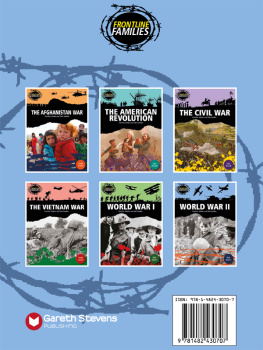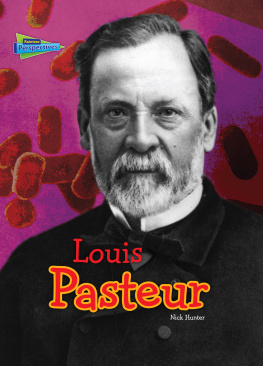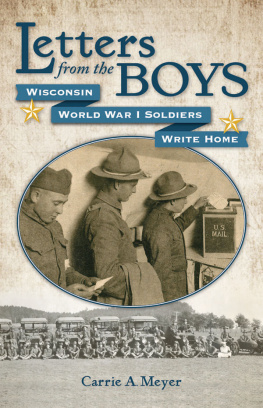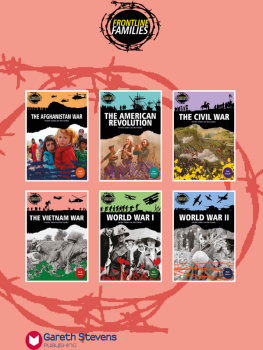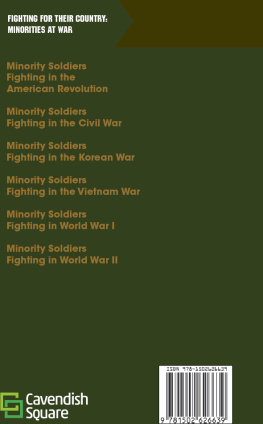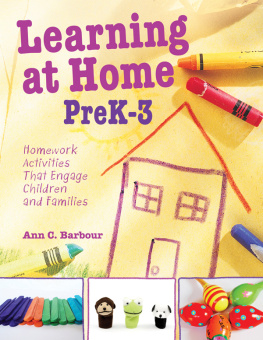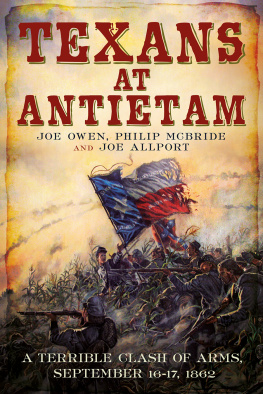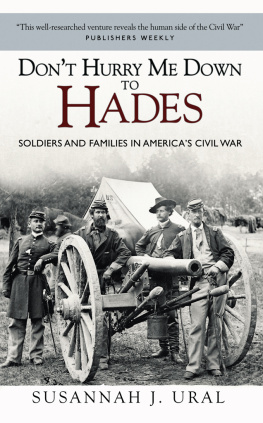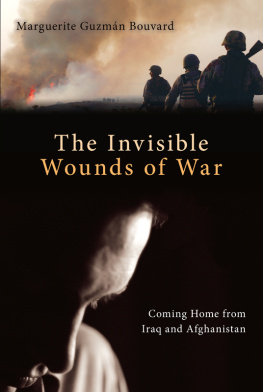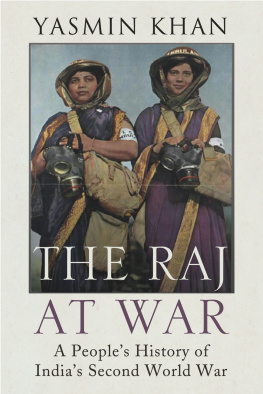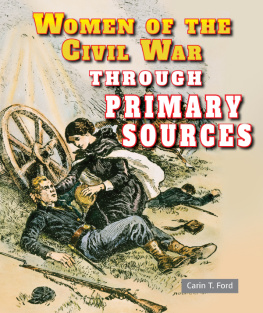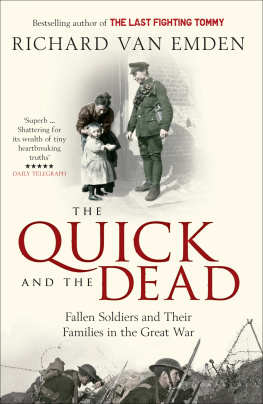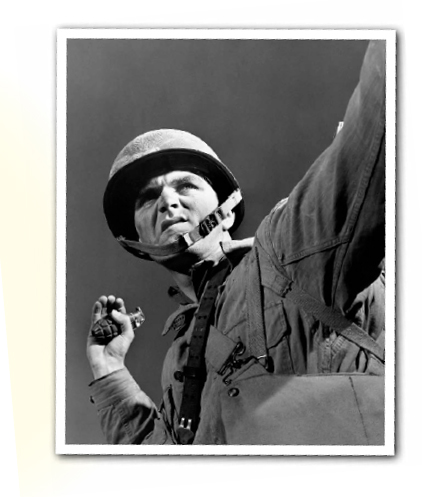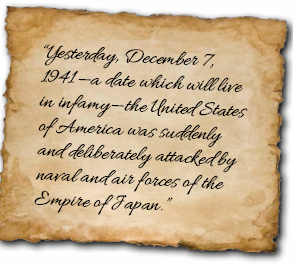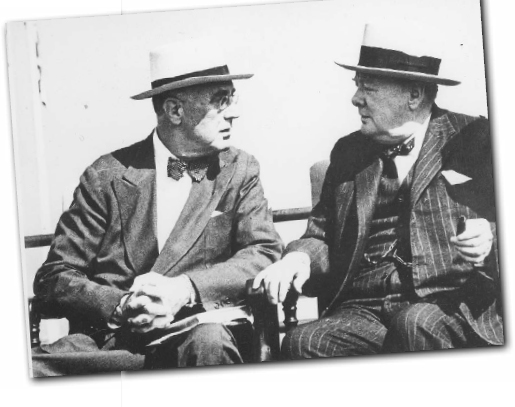
Please visit our website, www.garethstevens.com. For a free color catalog of all our high-quality books, call toll free 1-800-542-2595 or fax 1-877-542-2596.
Library of Congress Cataloging-in-Publication Data
Hunter, Nick.
World War II: frontline soldiers and their families / by Nick Hunter.
p. cm. (Frontline families)
Includes index.
ISBN 978-1-4824-3069-1 (pbk.)
ISBN 978-1-4824-3072-1 (6 pack)
ISBN 978-1-4824-3070-7 (library binding)
1. World War, 1939 - 1945 Juvenile literature.
2. World War, 1939 - 1945 Social aspects Juvenile literature.
I. Hunter, Nick. II. Title.
D743.7 H86 2016
940.53d23
Published in 2016 by
Gareth Stevens Publishing
111 East 14th Street, Suite 349
New York, NY 10003
2016 Gareth Stevens Publishing
Produced by Calcium
Editors for Calcium: Sarah Eason and Rachel Warren Chadd
Designers: Paul Myerscough and Jessica Moon
Picture researcher: Susannah Jayes
Picture credits: Cover: Wikipedia Commons: Library of Congress/Toni Frissell; Inside: Shutterstock: Tom Antos 10b, Astudio 44, Songquan Deng 17, Sergey Goryachev 15r, 33tl, Len Green 10t, IanC66 15l, KN 20, Dan Kosmayer 45, Kuco 43, Riccardo Livorni 18, Mediagram 33tr, Pe3k 41, Philipimage 39, PlusOne 40, D Russell 78 23, Ken Sato 42, Russell Shively 34, Keith Tarrier 31; Wikimedia Commons: 26, 38, Imperial War Museums 19, 25, Library of Congress 29, 36, Library of Congress/Toni Frissell 1, 24, National Archives and Records Administration 4, 5, 7t, 7b, 9, 21, 22, 30, 35, 37, United Kingdom Government 28, US Navy 27, Waralbum.ru 12.
All rights reserved. No part of this book may be reproduced in any form without permission from the publisher, except by reviewer.
Printed in the United States of America
CPSIA compliance information: Batch #CS15GS: For further information contact Gareth Stevens, New York, New York at 1-800-542-2595.
CONTENTS
Chapter 1 World War II
Chapter 2 Fighting the War
Chapter 3 Families Under Fire
Chapter 4 Women at War
Chapter 5 The War Economy
Chapter 6 Persecution and Genocide
Chapter 7 Victory and Recovery
Glossary
For More Information
Index
CHAPTER 1
WORLD WAR II
When World War I ended in November 1918, people around the world hoped that the terrible bloodshed of that conflict would never be repeated. Twenty years later, the children of those who had fought in World War I, or worked in the arms factories and hospitals, were again plunged into a horrifying war.
Invasion Begins
World War II began in September 1939 when Germany, led by Adolf Hitler, invaded Poland. Britain and France then declared war on Germany. By the summer of 1940, Hitlers armies controlled much of Europe, including France. Britain stood alone against Germany, who agreed a pact with their main allies, Italy and Japan, in September 1940. Hitler then turned his attention east, launching an invasion of the Soviet Union in June 1941.
Japan had invaded China in 1937. After its alliance with Hitler, Japan started building an empire in Southeast Asia. To extend their power in the Pacific, Japans generals believed they needed to cripple the US navy, based at Pearl Harbor in Hawaii. On December 7, 1941, they launched a surprise attack on the naval base. The United States now had no choice but to join the fight against Japan, Germany, and their allies.
Although the United States involvement in World War II began with an attack on US soil, most of the fighting took place far from home, in Europe and East Asia.
Primary Source: What Does It Tell Us?
On December 8, 1941, President Franklin Roosevelt addressed Congress and the American people, by radio, following the Japanese attack on Pearl Harbor. What do you think the presidents words tell us about the effect the attack had on the American people?
Families in World War II
The war lasted until 1945, and millions of soldiers died. However, the war also devastated the lives of millions of men, women, and children who were not in uniform. Ordinary families were targeted with bombs or attacked by invading forces. German and Japanese troops believed that they were superior to people of other races, leading to brutal treatment of those they thought of as inferior. In the greatest crime of all, around 6 million Jews were murdered in the Holocaust, a deliberate attempt to wipe out an entire people.
US President Franklin Roosevelt and British Prime Minister Winston Churchill did not always agree, but they formed a strong alliance.
WHAT CAUSED THE WAR?
In many ways, the peace treaties agreed after World War I made another war inevitable. Germany had agreed to end the fighting without actually being invaded, and many Germans believed their generals had betrayed them. Adolf Hitler, a corporal in the German army who had been injured in the war, was one supporter of this theory, blaming traitors and Jews for Germanys downfall.
Holding a Grudge
One big grievance for many Germans was the way Germany had been treated after the war. The country had lost land to France, Poland, and Czechoslovakia. Germanys armed forces had been dismantled and the country had been forced to hand over vast amounts of money to the victors.
Secondary Source: What Does It Tell Us?
In January 1939, Time magazine named Adolf Hitler as its Man of the Year for 1938. He had already taken over Austria and Czechoslovakia, and Time recognized the threat that Hitler posed to peace. What picture of Hitler is painted by the words in the magazine?
When Germany was blamed for causing World War I, Hitler vowed to make the country great again.
The Nazis Take Power
After 1929, the world was hit by economic turmoil in what became known as the Great Depression. Germans suffered more than most and they looked for people to blame for their troubles. Foreigners and Jews were presented as the cause of their problems. Adolf Hitlers National Socialist, or Nazi, Party encouraged this view and won 37 percent of votes at an election in 1932. In January 1933, Hitler became Chancellor of Germany.
During the 1930s, Hitler rearmed Germany, while restricting the freedoms of Germans. His supporters attacked or arrested anyone who disagreed with them. In 1938, Hitler invaded German-speaking Austria, where he had been born. Britain and France were desperate to avoid war and allowed him to invade Czechoslovakia. Hitler believed he could do whatever he wanted, but when he attacked Poland on September 1, 1939, Britain and France decided enough was enough, and Europe was once again at war.
Next page
